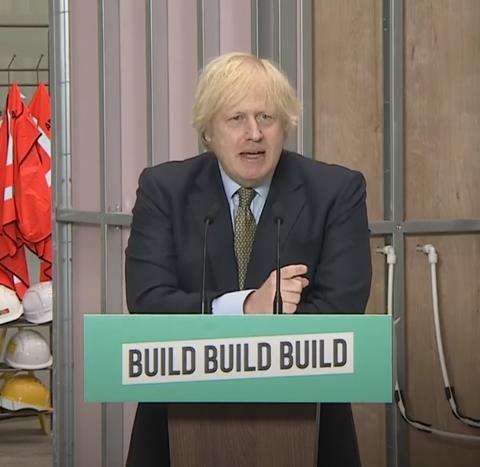Shadow housing secretary Thangam Debbonaire brands expansion of permitted development “astonishing”
Labour’s shadow housing secretary Thangam Debbonaire has hit out at plans announced by the prime minister last week to stimulate housebuilding by cutting planning controls.

Debbonaire (pictured, right), appointed to the shadow cabinet-level position by Kier Starmer upon becoming leader in April, told Housing Today that “planning is not the problem” and said the government was attempting to ignore local democracy and local needs and simply prioritise developer profits.
Her comments follow Boris Johnson’s announcements last week of a series of measures designed to weaken planning controls, including a raft of new permitted development rights, and a promise of fundamental reform to the whole system devised originally by the postwar Labour government.
They also come in advance of an expected announcement today of further measures to stimulate the economy from chancellor Rishi Sunak, including an expected short-term stamp duty holiday for house sales worth less than £500k.
Debbonaire, MP for Bristol West since 2015, said the planning reforms announced by Johnson were consistent with a desire to “bypass local democracy, ignore local needs, […] allow for property development to be based on increasing sales and profits rather than actual living conditions, quality and environmental sustainability.”
Describing his reforms as “astonishing, she said: “We have a prime minister announcing that he wants to bypass the local planning process.”
She said that the measures ignored those “overwhelmingly on low incomes and also disproportionately BME people” who suffered during lockdown in poor and overcrowded housing without access to open space. Last week a report by the Resolution Foundation found that those on low incomes and from black or minority communities had suffered disproportionately from poor housing conditions during lockdown.

Her comments also follow growing concerns over the quality of homes produced under existing permitted development rules, such as Terminus House in Harlow (pictured), which allow conversions of commercial premises into homes without planning permissions.
A 2018 study by the RICS found the quality of homes created under permitted development was significantly lower than other new housing, with the rules being used in at least one case to get permission for flats without windows.
Among the new permitted developments announced last week, Boris Johnson gave the go-ahead for a long trailed right for developers to demolish and rebuild existing commercial premises as homes without planning permission, and for homeowners and freestanding blocks of flats to extend upwards.
Advocates of permitted development rights credit the relaxation on office to residential conversions in 2013 with sparking a mini building boom. Government figures suggest that more than 50,000 homes were produced from that PD right alone between 2015/16 and 2018/19.
However, Debbonaire said: “The covid crisis should have shown the PM what was needed, what he could have announced last week, which is an investment in housing that’s truly affordable, of high quality, doesn’t keep people in rabbit hutches with no access to open space, as it has over the last three months.”
“And yet they’re cutting the planning process out. That’s where you get the quality assessment,” she said, adding that it wasn’t enough to rely on the goodwill of developers, and that it was “astonishing” the government would treat the system as an “irritant”.
“I am not saying planning is perfect. But planning is not the reason we don’t have enough homes. There are hundreds of thousands of planning permissions that are unbuilt out that property developers – mostly the big ones – are sitting on.”

Announcing his plans last week, the prime minister (pictured, right) said his reforms were designed to address the “chronic failure of the British state” to build enough homes. He insisted that new homes would be beautiful and low carbon, but derided planners as “newt counters” and said delays in the planning system were “a massive drag on the productivity and the prosperity of this country”. He said: “This government will shortly bring forward the most radical reforms of our planning system since the end of the second world war.”











No comments yet